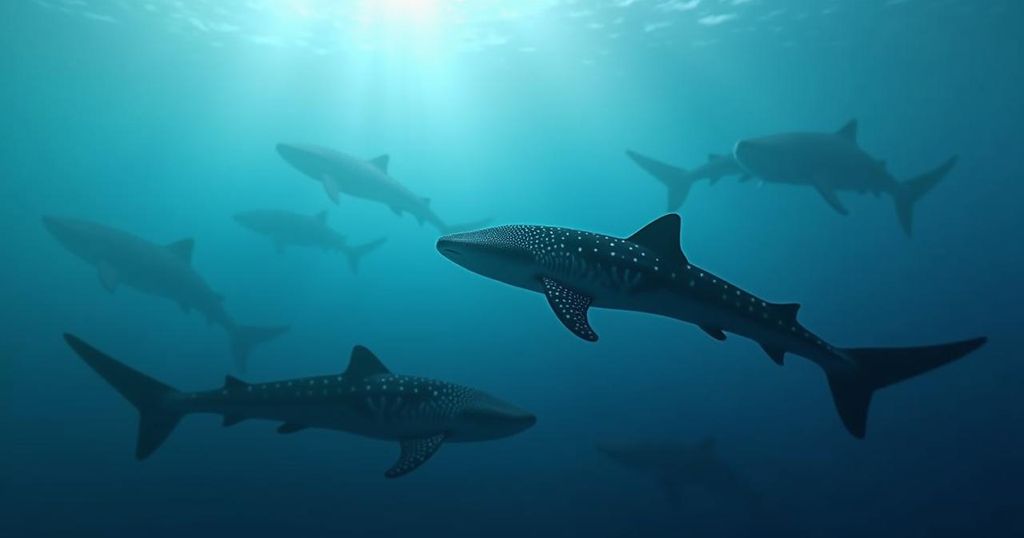A recent study reveals that endangered whale sharks are increasingly at risk of collisions with large ships due to climate change, which is altering their habitats and pushing them into busy shipping lanes. By the end of the century, it is predicted that the likelihood of encounters with ships could increase by 15,000 times. The research underscores the importance of addressing climate change to mitigate its impacts on vulnerable marine species.
Recent research highlights a troubling trend regarding endangered whale sharks, as global warming has caused these massive creatures to venture into perilous shipping zones. The largest fish species, capable of exceeding 60 feet in length, face increased risks of catastrophic collisions with large vessels due to rising ocean temperatures. Scientists from the University of Southampton and the Marine Biological Association (MBA) warn that changing oceanic conditions will compel these already imperiled sharks into new habitats that intersect with busy maritime routes. The findings, published in the journal Nature Climate Change, project that the likelihood of whale sharks encountering large ships may increase by a staggering 15,000 times by the century’s end. Dr. Freya Womersley, the study’s lead author, stated that the most severe habitat modifications are anticipated under high greenhouse gas emission scenarios. These shifts could lead to significant losses of critical habitats in specific regions while concurrently raising the chances of whale sharks cohabiting with shipping traffic. Whale sharks are known for their mobility and adaptability to fluctuating temperatures; however, they also show an alarming susceptibility to ship strikes, often with fatal consequences. Employing satellite tracking data alongside global climatic models, the researchers created projections to assess whale shark distributions under three different climate scenarios. Their projections suggest that under current emission trajectories, over 50% of critical habitats could be lost by the year 2100, particularly in Asian waters. Conversely, scenarios aligned with sustainable development goals aimed at limiting global warming to 2°C indicate potential habitat gains, especially in European regions. Professor David Sims, a collaborator on the study, emphasized that habitat displacement could be mitigated if efforts are made to curtail climate change, underlining the importance of proactive measures to protect vulnerable marine species from the multifaceted impacts of climate change. By integrating distribution data with information about shipping density, researchers concluded that shifting whale shark habitats would likely lead them into areas of increased shipping traffic, enhancing the risk of collisions. Specific regions, including sections of the North Pacific USA, the eastern Chinese seas, and parts of the North Atlantic near Sierra Leone, are identified as new habitats that overlap with major shipping routes. Fortunately, elsewhere, such as in the Gulf of Mexico, there may be a shift reducing overlaps with busy traffic areas as habitats move closer to the coast, away from the busy shipping lanes. Overall, increases in ship co-occurrence are expected across all future climate scenarios, regardless of whether shipping traffic remains at current levels or expands significantly by 2050. Dr. Womersley concluded that this research illustrates the indirect effects of climate change on highly mobile marine species due to the interconnected pressures from human activity and environmental changes. The findings necessitate that climate change considerations be integrated into strategies for managing endangered species.
The research presented in this study provides essential insights into the evolving challenges faced by whale sharks as a result of climate change. Whale sharks, recognized for their size and distinctive patterns, are listed as endangered, and with increasing ocean temperatures altering their habitats, there is a heightened risk of their interactions with commercial shipping routes. Understanding the implications of these shifts is critical for conservation efforts and policies aimed at protecting these majestic marine animals. Notably, the study utilizes advanced climate models and satellite tracking technology to forecast future distributions and habitat overlaps, allowing for a comprehensive analysis of how continued climate change could influence marine ecosystems and species survival.
In summary, climate change is significantly impacting the habitat of endangered whale sharks, pushing them into areas that intersect with busy shipping lanes, thereby increasing their risk of ship collisions. Such findings underscore the urgency for collective action to mitigate climate change, as preserving whale shark populations necessitates adapting management strategies to encompass the complexities of their shifting environments. Furthermore, a proactive stance towards reducing emissions could alleviate some of the extreme habitat losses projected for the future.
Original Source: www.fox28spokane.com






